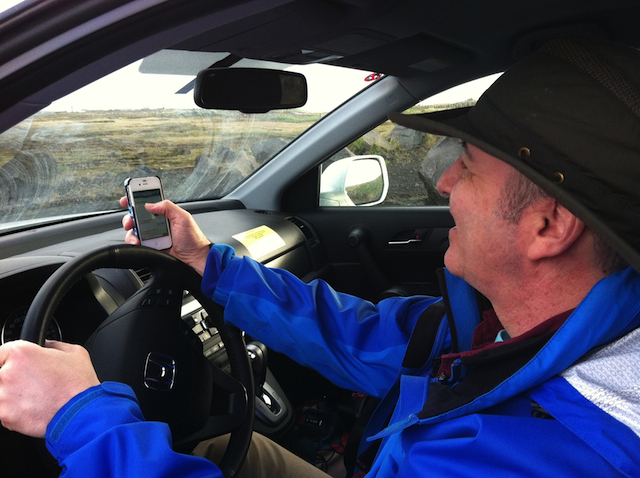
Another idiot who's texting while driving!
(It's actually the author of this post, Bruce Weinstein, and the car isn't in traffic. It isn't even moving.)
Two new iPhones are about to flood the market. I -- and maybe you too? -- join millions of people around the world who can't wait to own one.
We'll be able to do things faster and better than before, so what's the downside?
I call it iSolation. It's not a function solely of Apple products, of course, but whatever the source, there are three major costs associated with our obsession with technology.
Cost #1: Opportunities
Our social fabric is in danger of being ripped to shreds as we swap electronic connection for personal relationships. The nature of community depends upon us being connected to one another. Being civil means, or at least used to mean, valuing relationships beyond our immediate circle of family and friends. When we're deeply immersed in our gadgets, we miss the chance to make new friendships, renew old ones, or simply say hello to a stranger. A community isn't merely a collection of individuals. It's a web -- the kind with a small "w" -- of interconnectedness, and this web cannot function effectively if most of its constituents are self-absorbed.
It's in our own interest to resist a preoccupation with ourselves. As Kurt Vonnegut told the graduating classes of Hobart and William Smith Colleges, "What should young people do with their lives today? Many things, obviously. But the most daring thing is to create stable communities in which the terrible disease of loneliness can be cured."
Cost #2: Creativity
The second cost of iSolation is to our psychological health. I don't know about you, but my best ideas come when I'm either doing something mundane like brushing my teeth, or simply daydreaming. To be creative is to have the freedom to dream, to let thoughts appear and evaporate, or just to play. Some of the time spent fidgeting with a smartphone is time we could put to better use, such as doing nothing at all. When our brains are constantly stimulated by electronic data, they are, of necessity, precluded from taking anything else in, such as the random thoughts that can be the genesis of great ideas. The nonstop avalanche of images and sounds from electronic media (among other distractions) is a barrier, not a portal, to creativity.
If your closet is packed wall-to-wall with clothes, you don't have room for a shirt, blouse, or pair of slacks that might make a better addition to your wardrobe than some of the things you have now. If your mind is crowded, it has no room for new thoughts that might enrich you in ways you can't imagine.
Cost #3: Life
The third cost of our technophilia is the most serious of all: the possibility of an increased risk of morbidity and mortality. A study published in The New England Journal of Medicine concluded that drivers who use a smartphone are four times more likely to be involved in an accident than are drivers who do not. The risk increases to 23 when multitasking behind the wheel involves texting. We are, to borrow a phrase from the late cultural critic Neil Postman, amusing ourselves to death.
Werner Herzog's latest film, From One Second to the Next, vividly illustrates the dangers of texting while driving. It's difficult but essential viewing.
Smartphones, Smart Choices
This isn't a call to return to the days when people got their entertainment by huddling together in front of a radio (though I'll admit that does sound pretty good). Nor do I take issue with selling newer and better gizmos as such. After all, technology is morally neutral. It can be put to useful or harmful ends.
I propose the Kenny Rogers Rule for using technology wisely. In "The Gambler," Rogers sings about playing poker and knowing when to hold 'em or fold 'em. Don Schlitz, the writer of the song, was channeling Aristotle, who in his Nicomachean Ethics spoke of the virtue of practical wisdom or prudence as an essential component of the good life. As we wait for the new iPhones to come to market, I suggest a new verse for Don and Kenny's classic tune:
You got to know when to use it
Know when to lose it
Know when to have some fun
Know when to quit
You never text your buddy
While you're sittin' at the dashboard
They'll be time enough for textin'
When the ride is done
* * *
A less witty and slightly more self-righteous version of this article appeared earlier in Bloomberg Businessweek.
I'll speak at your organization on this topic and others. Contact me here.
